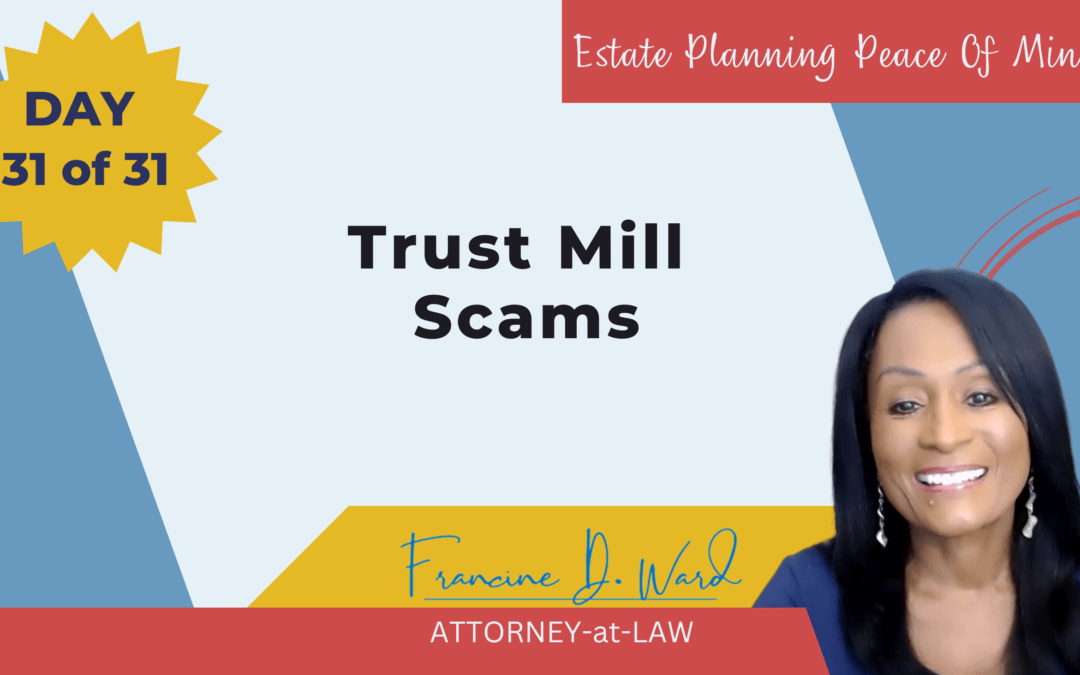Do You Really Want to Work?
Five years ago, people complained they couldn’t find work. Today, there are so many jobs available, and no one wants to work. Instead, robbers, burglars, drug dealers, and scammers pervade the landscape. Scamming has become the new normal. Cheating, conning, and swindling hard working people out of their money and property is very real. Many federal government agencies, including the Federal Trade Commission and the California Attorney General—among other entities—have taken note. The top scams are investment scams, romance scams, gift card scams, Covid scams, AND trust mill scams.
Trust Mills.
Trust mills are companies that advertise on television, social media, and in print offering to sell living trusts. Generally they offer this service without the benefit of a lawyer. And as with any profession, some lawyers are scammers, too. These trust mills spit out documents that have very little connection to the law. Preparing an estate plan involves important legal, financial and personal decisions. For that reason, it is essential that documents are properly prepared and executed. If they are not, there could potentially be long term damage.
A hard sell is bad enough when buying a car. But when dealing with an issue as personal as your estate plan, you want someone who cares enough to understand your needs and knows the law; someone who has invested time and energy in staying current, and someone with a valid license to actually practice law. The last thing you need is a scam artist trying to sell you something you don’t need or something they are unqualified to offer. They often lure you in with free seminars and ultra-cheap products—in the beginning. Then the fix is in. They get your personal information and leave you with empty pockets and invalid and defective documents.
Beware of the Scammers
Here are some tips and traps the California Attorney General offers:
- A person might call themselves a “trust advisor,” or “senior estate planner,” or “paralegal,” or some similar title, and they may claim to have educational credentials or “certification.” Insist on the person’s identification and a description of his or her qualifications, education, training, and expertise in estate planning. Ask them if they have any state bar or government accreditation, and if they say they do, then tell them that you will check with the state agency before making any decisions.
- Legal document assistants are not permitted to give legal advice, and paralegals must work under the direct supervision of a lawyer.
- Not everyone needs a living trust. Be wary of doing business with anyone who says otherwise or promotes one-size-fits-all living trusts or living trust kits.
- Don’t let yourself be pressured. Take time to carefully consider your decision and discuss it with trusted family members, your lawyer, and any other financial advisor you trust or have worked with in the past.
- Don’t let yourself be frightened. Salespeople may use a review of your investments to scare you into believing your investments are unsafe, and that by “moving” your money, you can earn higher interest with less risk.
- Watch out for companies that sell trusts and also try to sell annuities or other investments. For example, you may be told that your bank account are less safe than annuities or other investments that they want you to buy. But the new investment may actually be less safe. It may also have serious costs and less liquidity—that is, you may not be able to use your funds before some future date without paying substantial penalties. Seniors, for example, can find themselves trapped in annuities that will not complete paying out until some far distant future date.
- Sales agents may fail to disclose possible adverse tax consequences or early withdrawal penalties that may be incurred when transferring stocks, bonds, certificates of deposit or other investments to annuities. Make sure all of these issues are addressed before making a final decision.

Francine D. Ward
Attorney-At-Law, Author, Speaker
Follow Francine:
Don’t miss Francine’s Latest Blogs:
- Sweepstakes ScamsSweepstakes Scams. The Federal Trade Commission (FTC) has settled with several operators of a sweepstakes scam. The scam bilked consumers out of millions of dollars. Included in the settlement agreement,… Read more: Sweepstakes Scams
- Incapacity PlanningIncapacity Planning. Incapacity is an unexpected wrinkle in your estate plan. I am a planner. I make plans, I like making plans, and sometimes my plans go awry. Despite any… Read more: Incapacity Planning
- Publishing contractsPublishing contracts The publishing contract is an agreement that defines the relationship between an author and her publisher. Publishing contracts typically contain elements that speak to territory, rights, ownership, financial… Read more: Publishing contracts
- What is a Habit?As we enter springtime, you may feel far away from your New Year’s resolution. That may be because of the success rate of NYE resolutions. In fact, January 17 is… Read more: What is a Habit?
- Common Contract MistakeCommon Contract Mistake #1. Not Having Written Agreements with EVERYONE You Do Business With. Common contract mistake. Without question, the most common contract mistake is not having the terms of… Read more: Common Contract Mistake











